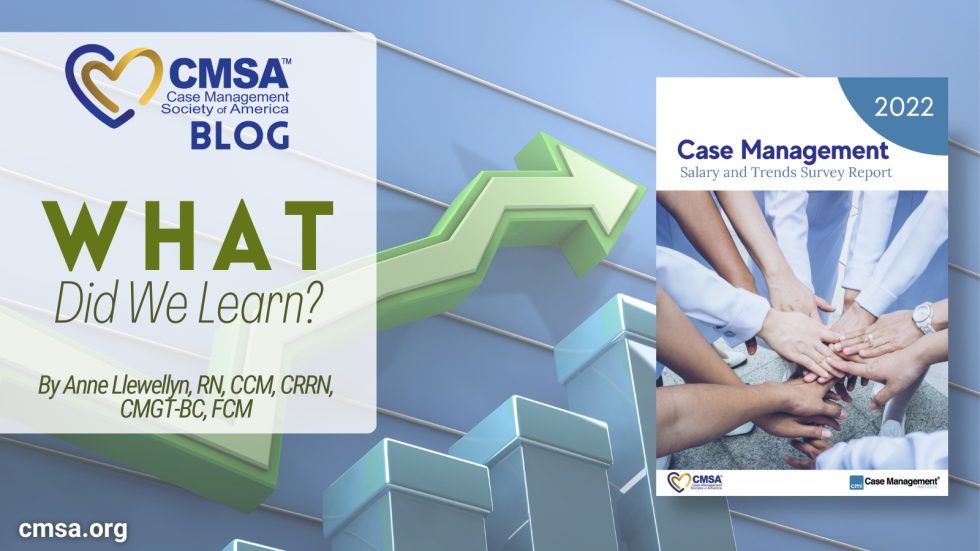By Anne Llewellyn RN, CCM, CRRN, CMGT-BC, FCM
The 2022 Case Management Salary and Trends Survey is available to download and read! Released at the 2022 CMSA Annual Conference, the report was the result of a collaboration between CMSA and the Case Management Institute and contributions by over 2000 case management professionals from across the country and from various sectors of the industry.
The report is a snapshot of Salaries and Trends impacting the specialty of case management. The report has taken the pulse of the case management industry since 2018. The 2022 Case Management Salary and Trends report shows the progress case managers have made in salary and benefits along with the value case managers bring to the healthcare industry.
Here are some of the highlights that I have gleaned from this year’s survey:
- Younger professionals are entering the practice of case management. As a result, those hiring case managers need to make sure there is robust training for those coming into the practice since they have less practical experience than their senior counterparts.
- The practice is “female” dominated with only 2% of case managers being male. As the workforce shifts, leaders and human resource professionals must stay updated on how to adapt to a more gender-diverse workforce.
- Case Management is primarily a nursing specialty; yet, we say case management is a multidisciplinary practice. So the question remains: How do we attract other healthcare disciplines into the practice?
- 91% of case managers learn case management on the job. To encourage new professionals into the field of case management, incorporating case management training into the curriculum for professionals in health education classes at the bachelor’s and master’s degree level programs is suggested.
- Case managers receive various benefits as part of their compensation package and over 90% are satisfied (≥3) with the benefits they receive.
- It appears that case managers have the opportunity for a good work-life balance with adequate vacation time, time off for holidays and little required overtime. Since 2015, this trend has been moving in a positive direction with fewer case managers being required to work weekends and overtime. The requirement to work holidays has remained about the same.
- The COVID-19 Pandemic played a significant role in this shift with nearly half of all case managers reporting a change in their primary methods of interaction due to the pandemic.
I hope you will take time to download this important report. Here is the link: https://casemanagementinstitute.com/2022-case-management-salary-and-trends-survey
Make sure you take time to share it with your colleagues, use it to improve your departments and most of all, use it to celebrate the work that you do every day!
Bio: Anne is a registered nurse with over forty-three years of experience in critical care, risk management, case management, patient advocacy, healthcare publications and training and development. Anne has been a leader in case management and was the President of the Case Management Society of America 2003-4. She was awarded their Lifetime Achievement Award in 2015 for her service to the case management industry. She also served on the Patient Advocate Certification Board and was one of the professionals to develop and launch the first National Certification in Patient Advocacy. Anne is also a patient, a Brain Cancer Survivor, who uses her expertise and knowledge to educate people about how to navigate the complex healthcare system and remind healthcare professionals about the importance of providing patient and family-centered care. Today, Anne works as a Nurse Advocate to assist people on their healthcare journeys.
Stay up to date on the case management industry by subscribing to the CMSA Pulse e-Newsletter: https://cmsapmg.wpenginepowered.com/cmsa-pulse/


1. Majority of ads for hospital case mgrs call for RN…and no case mgt leader in the hospital is challenging that assumption. Most in fact, use RN Case Mgr as title – a throw-back to the 1990s.
2. On the job training resulted primarily from the elimination of the ‘education’ line item on most dept budgets. It perpetuates the insular character of outmoded models.
Great information, Anne. Another part of the question “How do we attract other healthcare disciplines into the practice?” should be “How do we attract younger RN’s into the profession of case management?”